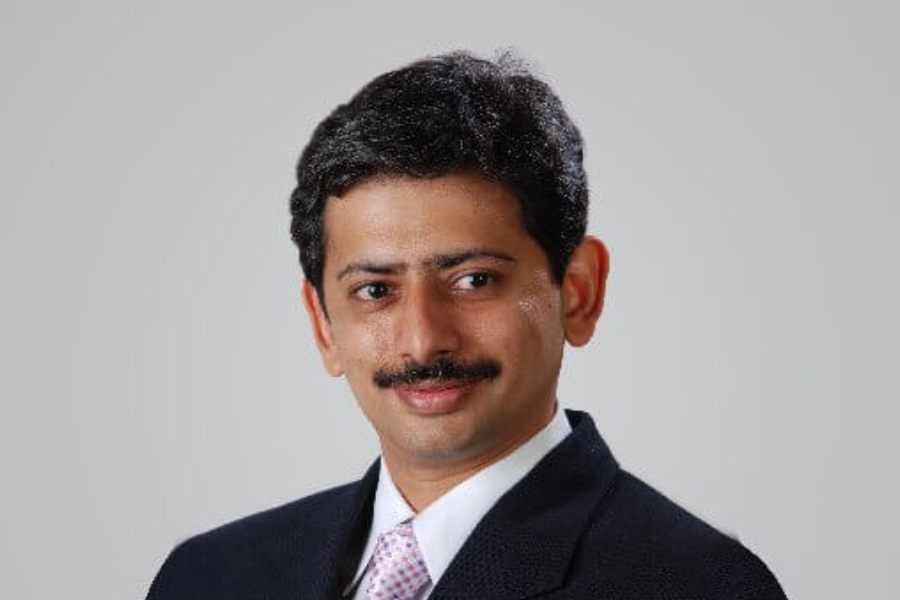Government subsidies driving exponential growth in EV sector
Electric mobility in India is rapidly gaining momentum as the country embraces sustainable transportation solutions. With a growing focus on reducing pollution, decreasing dependency on fossil fuels, and promoting clean energy, electric vehicles (EVs) are emerging as a promising and eco-friendly alternative to traditional combustion engine vehicles.
ETO, an innovative all-electric mobility ecosystem, is revolutionizing passenger transportation and first and last-mile logistics. Powered by pioneering engineering and innovative manufacturing, ETO offers a comprehensive range of solutions to address the diverse needs of the mobility landscape.
Dr. Karthik S Ponnapula, Director, ETO Motors in a conversation with IBT, discussed the company’s mission and the ongoing and future government policies that have been supporting the e-mobility sector.

IBT: What inspired you to establish ETO, and how did you envision its role in revolutionizing transportation in India by 2030?
Dr. Karthik S Ponnapula: My family ventured into the EV business a few years ago with the establishment of a company named Olectra. This endeavour was carried out in collaboration with BYD, and it marked the introduction of India’s first electric bus onto the streets. Subsequently, this company evolved to become India’s largest e-bus manufacturer, going public and achieving remarkable success.
During this journey, we gained invaluable insights into the EV ecosystem and learned how to effectively promote EV adoption in India. As a result of our observations and understanding of the ecosystem, we identified a significant opportunity to electrify a substantial portion of the transportation sector by focusing on the three-wheeler population.
We dedicated significant time to comprehending the ecosystem of three-wheeler drivers, as well as the operation and economics of three-wheelers in general. We sought to understand how they earn a living, the systems they operate within, and the daily lives of the drivers. This understanding gave birth to ETO, essentially an all-encompassing electric platform. ETO operates as a comprehensive 360-degree company, covering various aspects of the value chain, including vehicle manufacturing, deployment, and the establishment of charging infrastructure.
As we delved deeper into our research and expanded our operations, we gained a better grasp of the three-wheeler driver economy. This knowledge fueled our drive to disrupt the industry. Instead of persisting with drivers in the informal economy using outdated vehicles, we aimed to bring them into a more formal, tech-enabled, and forward-thinking economy. We successfully scaled up our efforts in this direction.
Our unique position in covering the entire value chain allowed us to integrate feedback seamlessly. We not only catered to our three-wheeler drivers and deployments but also used this feedback to enhance our vehicles. Additionally, our deployment experience enabled us to effectively implement charging solutions for both three-wheelers and two-wheelers. Through continuous learning and growth, we have successfully expanded and adapted.
IBT: Great. Okay, so can you elaborate on ETO’s mission and vision, particularly in terms of providing zero emissions mobility and charging solutions?
Dr. Karthik S Ponnapula: If we examine the situation from a broader perspective, India is facing a pressing need for change. First and foremost, there’s the issue of pollution levels in India, with the country ranking among the most polluted cities in the world. Additionally, India heavily relies on foreign oil sources. When you consider the combination of these factors, it becomes evident that there is a compelling necessity for a transition to electric vehicles (EVs). Fortunately, the government has recognized this need and has been actively supporting the growth and adoption of EVs.
What I observed as a general trend is that while reaching individual consumers in the passenger car sector will eventually happen, it will take some time. To make significant progress in combating pollution and related issues, I believe it’s essential to initially focus on addressing the bottom of the pyramid, so to speak, or prioritize mass transit. This approach allows us to tackle many of the concerns people have regarding EVs and demonstrate their viability for everyday use.
Therefore, our strategy has been to concentrate on the three-wheeler segment in India, which is currently massive. We aimed to bring about significant change in this sector. Our approach is unique in that we are dedicated to empowering the drivers and transforming the industry, enabling many of these drivers to transition into a formal economy through digital transactions.
All of our vehicles are IoT-enabled and represent a forward-thinking approach. Unlike many vehicles currently in the market, our vehicles come equipped with a range of safety and tech features. These include seatbelts, comfortable bucket seats for drivers, improved passenger comfort, rearview cameras, and more. Our goal is to revolutionize the perspective on three-wheelers.
In this context, our primary focus has been on the drivers. We’ve developed a model that allows us to provide income guarantees to drivers and bring them into the 21st century. This means they no longer have to operate within the confines of an informal economy where they negotiate rates, handle cash payments, and worry about the uncertainty of vehicle breakdowns and downtime. We’ve addressed all of these concerns, and in doing so, we are truly disrupting the three-wheeler industry.
IBT: Could you share some insights into the technological innovations that ETO has introduced to the transportation sector in India?
Dr. Karthik S Ponnapula: To elaborate on each aspect within our comprehensive 360-degree spectrum, let’s start with manufacturing. Our vehicles are fundamentally designed as born-electric platforms. While it’s true that other three-wheeler manufacturers exist, some legacy players simply retrofit their vehicles with batteries, calling them EVs, which they technically are. However, they don’t qualify as born-electric platforms. The key distinction lies in the fact that all our platforms adhere to standardized designs, allowing us the flexibility to consistently adapt and enhance vehicles to improve efficiency and cater to specific customer needs. In addition to this, all our vehicles are IoT-enabled.
As I mentioned earlier, our vehicles are equipped with features such as a rearview camera, seatbelts, and bucket seats for enhanced driver comfort. In this regard, we’ve placed significant emphasis on ensuring that our vehicles not only maintain the efficiency expected of a three-wheeler but also incorporate the modern comforts found in many other vehicles today. This focus on aesthetics has resulted in the integration of various technologies.
Furthermore, all our vehicles come with a Vehicle Tracking System (VTS), which provides us with comprehensive data, including trip duration, typical passenger routes, battery status, and overall vehicle statistics. Utilizing this data and feedback, we can efficiently enhance customer service and continually improve our vehicles.
Moving on to the deployment aspect, we’ve introduced various technologies to revolutionize the industry. One noteworthy development is our driver-focused mobile app. Through this app, drivers can easily rent vehicles, monitor their charging status, and conduct transactions seamlessly. These features are integrated into our comprehensive application software suite, enhancing the overall experience for both drivers and passengers.
Additionally, through these systems, we gather a substantial amount of data, which we are currently compiling. As we continue to expand, the volume of data will increase, enabling us to leverage it for enhanced operational efficiency, superior customer service, and the overall improvement of the drivers’ daily experiences. In essence, from the perspective of deployment, our goal is to leverage technology to propel the industry forward, enhancing driver satisfaction, efficiency, and profitability, all while refining customer feedback mechanisms.
IBT: How does ETO address the infrastructure and charging station requirements for its zero-emissions vehicles, and what is the long-term plan for expanding this network?
Dr. Karthik S Ponnapula: We have two distinct approaches to this. First, we deploy our proprietary charging box known as the Thunderbox, which essentially serves as a highly cost-effective charger for two and three-wheelers. The method we employ for deployment involves crowd participation. We reach out to individual users, local kirana shops, and apartment buildings, where we begin installing these Thunderboxes. This installation comes at a very low initial cost for the consumers. If they have a compound wall, they can easily set up these Thunderboxes.
The significance of this initiative lies not only in providing additional charging points for two and three-wheelers but also in generating income for those who host these charging stations on their compound walls or at their kirana shops.
This approach attracts consumers to these charging points, which could be customers at a coffee shop or a kirana store, thereby boosting their business. Simultaneously, when you plug your vehicle into one of our ThunderBox chargers, you benefit from subsidized electricity rates, significantly lower than what you would pay for a regular wall plug. We engage in revenue sharing with our Thunder users, enabling them to generate income for themselves. At the same time, we also generate revenue by growing alongside the community.
Additionally, we have introduced India’s first government-certified fast charger specifically designed for two and three-wheelers. This fast charger, which we are currently rolling out, significantly reduces the charging time from approximately three and a half hours to just under an hour, allowing for up to an 80% charge. As a result, we have greatly enhanced our efficiency, enabling our drivers to operate for extended periods during the day. This, in turn, enables them to generate more income and allows us to offer superior service to our customers.
IBT: What challenges has ETO faced while working towards its goals, and how have you addressed them?
Dr. Karthik S Ponnapula: In terms of challenges, it’s important to note that any growing business, especially one that seeks to bring about change in an industry, will inevitably encounter hurdles. In this regard, we are no exception. We’ve encountered challenges such as the initial task of explaining the new system to drivers. It was imperative for us to understand their perspective and address their concerns effectively. However, once we accomplished this, we witnessed a remarkably high level of interest from drivers in joining the ETO platform. This has been a significant step forward in terms of addressing driver concerns and generating revenue.
Another challenge we faced was getting drivers to embrace the digital ecosystem. Instead of dealing with cash payments and negotiating with customers, we partnered with companies like Uber on the passenger side to facilitate digital transactions. We also worked towards providing our drivers with bank accounts, enabling them to engage in digital transactions seamlessly.
Furthermore, when it comes to scaling up, deploying three-wheelers onto the road requires government licenses, which can be a complex process. However, due to our unique structure and approach to vehicle deployment and manufacturing, we’ve managed to secure the highest number of passenger licenses in the country. This success in navigating the challenge has been made possible by our distinctive operational methods.
As a result, we are now able to put more drivers and vehicles on the road, gradually replacing diesel and CNG vehicles. When it comes to our overall growth, it’s essential to acknowledge that the EV industry is relatively new, and we are still navigating the challenges of deploying charging infrastructure efficiently to benefit our drivers in the future.
All these obstacles are surmountable, and we address them as they arise. We have invested significant research and effort into our business plan, which has allowed us to minimize many potential hurdles. However, we remain adaptable and have successfully overcome various challenges as they have arisen.
IBT: What is your assessment of how FAME 2 has contributed to sustainable mobility in India? Are there any particular anticipations or hopes for FAME 3, which is rumoured to be unveiled next year?
Dr. Karthik S Ponnapula: The Fame 2 subsidies have played a massive role in significantly accelerating the growth of EVs in India. These subsidies have provided substantial assistance to all EV industry players, and I must commend the Indian government for its commendable policies in this regard. These policies have not only made India a highly competitive player in the EV sector domestically but have also positioned India to shine on the global stage as a prominent EV provider.
In this light, I believe that Fame 2 is contributing to the tremendous growth potential of India’s EV industry, potentially making India a leading EV supplier to other parts of the world. Furthermore, the Fame 2 subsidies have effectively addressed critical questions concerning how to drive the widespread adoption of EVs.
The Fame 2 initiative has undeniably benefited both consumers and manufacturers. I hope to witness its continuation and refinement in the future. Looking ahead, I would like to see these subsidies persist, but with a focus on tailoring them to support manufacturers in further scaling up their production capacities in the months and years to come. This strategic approach will help solidify India’s position and competitive edge in the market, making it a formidable force to reckon with in the EV industry moving forward.
IBT: Looking ahead to 2030, what do you see as the most significant challenges and opportunities in the Indian transportation sector, and how does ETO plan to navigate them?
Dr. Karthik S Ponnapula: India is undeniably an enormous market with distinct characteristics, and it spans a vast geographical area with diverse requirements in various regions. To effectively cater to these diverse needs, one must possess on-the-ground experience. ETO has successfully expanded its presence to over nine cities in India, and we are continually establishing operations in more cities across the country. Through this extensive experience, we gain valuable insights into the specific needs and preferences of customers throughout India.
And so with that, we’re able to address those needs very efficiently. So I think that on-ground experience will continue to play an important role in growing and addressing the needs of consumers in India. And I think going forward, I think India is making all the right steps, and I think India is taking charge in terms of EV deployment and adoption very well. So I think as long as this trend continues to grow and we continue to sort of evolve, knowing that we want to become an electric-only country, I think we’ve continued to make the right choices. And I think as long as we are able to evolve along with the different needs as they come along, I think we’ll continue to grow. So I think the steps are good. I think it’s still a very early stage. So as it continues to change and we see the landscape more clearly, I think we’ll be able to navigate those very efficiently given our sort of on-ground experience today.
I believe that having experience and the ability to adapt to changing circumstances is crucial. ETO excels in this aspect because our team possesses a wealth of experience, not only from our journey with Olectra but also in the first and last-mile transportation space. We are all highly receptive to change and not rigid in our approaches. This openness to change makes it easy for us to navigate through any obstacles that may arise.
IBT: Can you share any future expansion plans or new initiatives that ETO is currently working on to further its mission?
Dr. Karthik S Ponnapula: As I mentioned earlier, we currently operate in over nine cities across India. We are committed to expanding our operations to additional metropolitan areas and tier-two cities. Our goal is to continue growing in India and further scale up our operations, creating improved opportunities for drivers to empower themselves.
One initiative that I take great pride in is our women empowerment initiative. In a traditionally male-dominated segment of transportation, we are actively encouraging and involving women in the workforce. I am genuinely pleased with the success of this initiative and believe that it’s making a significant impact.
One of our most successful projects to date is located in Kevadia at the Statue of Unity, where we operate a fleet of 200 vehicles, all of which are run by local tribal women. These women have been efficiently transporting passengers within an entirely electric vehicle zone. This initiative has proven to be incredibly successful.
We are collaborating with the government and the Ministry of Tourism to replicate this model at other tourist sites across the country. Beyond tourist destinations, we are committed to women’s empowerment throughout our nationwide fleet. By focusing on this aspect, we aim to tap into the untapped economic potential of women in India. I strongly believe that by empowering women and integrating them into the workforce, we provide them with the opportunity to achieve financial independence, a crucial step in India’s economic development. This integration of the entire workforce will significantly contribute to India’s growth.
Dr. Karthik S. Ponnapula, Director, ETO Motors is involved in the day-to-day affairs of the company and has a history of dynamic leadership. During his tenure on the board, he has led the transformation of ETO from a domestic automobile manufacturer into an international organization with a diverse range of products and services and a continuously innovative pipeline of technology. He continues to lead the various internal teams to develop further connections to all corners of the globe.













Leave a comment